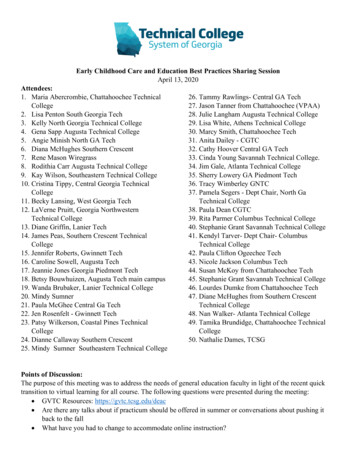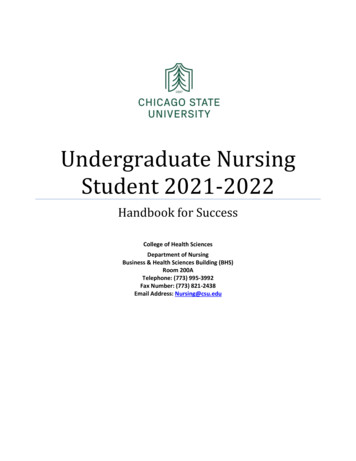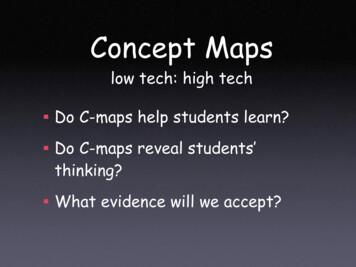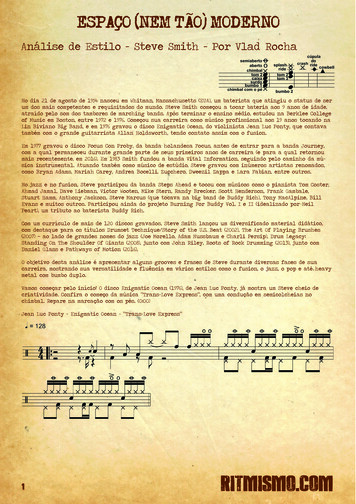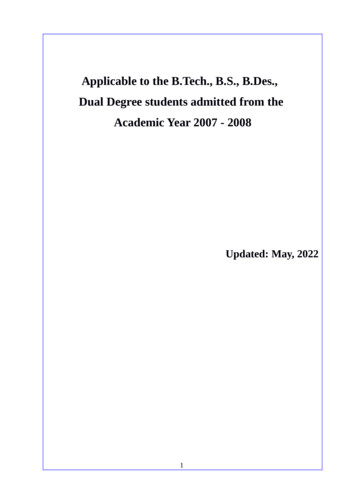
Transcription
Applicable to the B.Tech., B.S., B.Des.,Dual Degree students admitted from theAcademic Year 2007 - 2008Updated: May, 20221
Rules are classified into three sepreate categories as follows: (I) those which may beimplemented within a department by DUGC/DPGC, (ii) those that require a decision at thelevel of A/Dean AP, or UGAPEC/PGAPEC, based on recommendations from the departmentbodies (iii) those that need to be discussed in the Senate for a decisionTherefore, rules are colored with one of three colors.1. The color green indicates that the final authority for rule is the Convener DUGC2. The color yellow, and underlined means that the final authority is Associate Dean(AP)/Dean(AP).3. The color yellow, without an underline means that the Convener, UGAPEC is the authority.4. The color blue means that the final authority is the Senate5. The rule which is uncolored, is to be implemented strictly.2
1Organizational Structure for Academic Administration91.2Academic Calendar10CURRICULUM / PROGRAMME OF STUDY102.1Curriculum102.2Semester – Autumn, Spring, Summer102.3Course Credit System/ Structure112.3.1Theory and Laboratory Courses112.3.2Course B.Tech. Projects (BTP –I and BTP-II)122.3.4.2B.S. Project122.3.4.3Dual Degree Project (DDP)12Non Credit Requirements12NCC/NSO/NSS122.4Minimum Credit Requirements and Planning of Individual AcademicProgramme122.5Opportunities for Additional Learning: MINOR, HONOURS, etc. .132.5.1Minor142.5.2Honours142.5.3Two Minors etc.15ROLE OF FACULTY ADVISER15122.3.42.3.4.133
REGISTRATION164.1Semester-wise Registration164.2Procedure for Registration164.2.1Online Registration174.2.2Late Registration174.2.3Registration for the first two Semesters174.2.4Registration for third and subsequent Semesters174.3Registration for Institute Elective Courses174.4Registration for Non-credit Courses (NCC/NSO/NSS)174.5Registration for Projects184.5.1Registration for B.Tech. Projects (BTPs)184.5.2Registration for Dual Degree Projects (DDPs)184.5.3Registration for B.S. Projects184.6Course Adjustment/ Dropping of courses194.7Dropping of a Semester194.8Registration for Additional Courses: (Minor, Honours, etc.)204.9Summer term Course Registration20SPECIAL FEATURES IN REGISTRATION215.1Academic Standing215.2Permissible Registration Load225.3Carrying Backlogs forward235.4Audit Course235.5Registration for Post-Graduate level courses235.6Guided Study245.7Self-Study245.8Course Substitution24454
EXAMINATION / ASSESSMENT256.1Modes of evaluation for theory courses256.2Modes of evaluation for Laboratory courses266.3Modes of evaluation for Seminars266.4Modes of evaluation for Projects266.4.1B.Tech. Projects266.4.2Dual Degree Projects266.4.3B.S. Project286.4.4Extension Rules For Projects (R&D, BTP, DDP, B.S. projects)286.5Grading296.6Valid reasons for semester end make up examination316.7Academic Malpractice316.8SPI / CPI316.8.1Semester Performance Index (SPI)316.8.2Cumulative Performance Index (CPI)326.8.3Semester Grade Report336.8.4Transcript; Consolidated statement of Academic Performance336.9Display of In-semester performance336.10Disclosing the evaluated answer scripts after semester endexamination336.11Answer script retention period346.12Re-totaling of marks34Registration of NPTEL/ SWAYAM Courses347.1Credit Equivalence of NPTEL/SWAYAM courses with IIT Bombaycourses347.2Policy for registering/ award of grades for NPTEL/ SWAYAM/Semester Exchange courses34675
8CHANGE OF BRANCH359PERFORMANCE REQUIREMENTS369.1Award of degree369.2Award of Medals379.3Transfer to ARP389.4Early exit for poorly performing Dual Degree students3810UNDERGRADUATE RESEARCH AWARDS (URA)3911ACADEMIC REHABILITATION PROGRAMME (ARP)4012ALLOWING B. TECH. AND B.S. STUDENTS TO LEAVEAFTER COMPLETING THEIR CREDIT REQUIREMENTSFOR B.TECH./B.S. EARLIER THAN 4 YEARS4013CONVERSION FROM B.TECH. TO DUAL DEGREE(B.TECH. M. TECH.) PROGRAMME4114GUIDELINES FOR INTERDISCIPLINARY DUAL DEGREEPROGRAMME (IDDDP)4115SPECIAL LEAVE4216PLANNED BREAK FROM STUDIES4317UTILITY4318GLOSSARY446
PREFACEThe Indian Institute of Technology Bombay (IITB) is one of the Indian Institutes ofTechnology in the country, set up with the objective of conducting research, impartingeducation, and training in various fields of Science and Technology. The Institute is nowrecognized as a leader in science and engineering education worldwide. It has established afirm foundation for education and research with a vision to be the fountainhead of new ideasand innovations in technology and science. The mission of IIT Bombay is to create an ambiancein which new ideas, research and scholarship flourish and from which the leaders andinnovators of tomorrow emerge.IIT Bombay on an average annually admits more than 1000 candidates for theundergraduate programmes (B.Tech./ Dual Degree and B.S.) through the Joint EntranceExamination (JEE), more than 30 candidates for B.Des. Programme through the UndergraduateCommon Entrance Exam for Design (UCEED), around 300 candidates for the M.Sc. and theM.Sc. Ph.D. Dual Degree programmes, more than 1000 candidates for postgraduateprogrammes and around 300 candidates for Ph.D. programmes. IIT Bombay follows a creditbased semester system. There are two semesters in an academic year (Autumn: July- Nov; andSpring: January-April) during which all courses specified for various degree programmes areoffered. There is one additional term during summer, called the Summer Term, for summercourses. Students are required to meet specified academic requirements each semester.This booklet provides comprehensive information on the Rules and Regulations forB.Tech., Dual Degree, B.S. and B.Des. Programmes.IIT Bombay gives freedom to its various academic units to tailor their academicprogrammes as per their specific needs, within the frame work of the Rules and Regulationsapproved by the Senate from time to time. Keeping in view the new technical developments andto allow students some freedom to explore topics of their interest, IIT Bombay revised itsUndergraduate Programmes curriculum (w.e.f. the Academic Year 2013). The revisedcurriculum, provides additional opportunities and flexibility for students to optimize theirlearning experience. This needs continuous and meticulous planning of the academic profile onthe part of each student to fully utilize the opportunities. The students, and parents/ guardians,are therefore, advised in their own interest to get fully familiar with the Academic system of theInstitute. Student’s attention is brought particularly to the assessment procedures and thespecific rules governing the grading system, academic performance requirements etc.IIT Bombay offers its students best opportunities that are needed to create outstandingscientists and engineers. We hope that you will strive hard to utilize the resources available tofully develop your potential as an engineer/scientist/designer/economist/social scientist.We wish all our students a very bright future and a successful career.Dean of Academic Programmes7
1.INTRODUCTIONThe B.Tech./ Dual Degree/ B.S. programmes consist of courses in basic sciences,humanities and social sciences, engineering and technology and other related topics. Thesequence of studies broadly consists of three phases.The first phase is an intense study of sciences, mathematics and humanities for deeperunderstanding of concepts than what was done in school.The second phase is the study of engineering sciences and technical arts (such as workshop,engineering graphics, etc.). This study imparts broad based knowledge in general engineering,and engineering methodologies, and enables the students to appreciate the links between scienceand engineering. This phase is also, by and large, common across UG programmes, andoverlaps with the first phase.In the third phase, the students are exposed to subjects in their chosen areas of study,designed to train them in the methodologies of analysis of problems and synthesis of solutions.The courses cover the principles governing systems and processes, and develop the ability forphysical and analytical modeling, design and development. They are also introduced toengineering practices through laboratory courses, projects, etc., and these vary from disciplineto discipline.In parallel with the third phase, students can strive to broaden their perspectives throughatleast two open Institute electives where they can take courses drawn from across the Institute.B.S. programme students, in addition, work independently on a project in their last twosemesters.Dual Degree students do additional courses to get in-depth knowledge in their chosendisciplines, often with specializations. In addition, they work on a research and developmentproject during their final year.At various stages of the programme, students are initiated into research methodologies,reading and interpreting research papers, use of engineering and scientific equipments/instruments, modern computational techniques, writing technical and scientific reports andeffective communication.Apart from the minimum credit requirements for the award of the degree, opportunitiesexists for supplementing the learning experience by crediting additional courses, in diverseareas. These additional credits, when they are in focused areas, can earn the students credentialslike Minor/ Honors.The requirements for degree programmes run by the Institute are broadly classified as:a) Institute Requirements (further divided into Compulsory courses, Elective courses andother requirements).b) Departmental Requirements (further divided into Compulsory courses, Electivecourses and other requirements).The curriculum forwww.iitb.ac.invarious programmes are8available on the Institute website:
1.1Organizational Structure for Academic AdministrationThe academic programmes of the Institute are governed by Rules and Regulationsapproved by the Senate from time to time. The Senate is a statutory and supreme body thatgoverns all academic matters of the Institute, and the rulings of Senate Chairperson (Directorof The Institute) are final in regard to all academic issues. A definite time schedule is set by theSenate for various academic activities, through an Academic Calendar issued at the beginning ofeach academic year.The Senate continuously assesses the academic programmes and makes appropriaterevisions/ modifications/ improvements as and when required through two Institute level Senatesub-committees: The Undergraduate Programmes Committee (UGPC) for undergraduateprogrammes and a Post- Graduate Programmes Committee (PGPC) for post-graduateprogrammes. The Dean of Academic Programmes (Dean, AP) and the Associate Dean ofAcademic Programmes (Associate Dean, AP) are the Conveners & Co-convenersrespectively of these committees.Similarly, the performance and evaluation related issues are monitored by the Senatethrough two Institute level committees: Undergraduate Academic Performance EvaluationCommittee (UGAPEC) and Postgraduate Academic Performance Evaluation Committee(PGAPEC). Conveners for these committees are designated from among Senate members.These four committees make recommendations to the Senate and in turn seek/ receive opinions/recommendations, when required, from the two Department level committees in eachdepartment, the Department Undergraduate Committee (DUGC) and the DepartmentPostgraduate Committee (DPGC). The DUGCs and DPGCs handle all academic matters, relatedto both academic programmes as well as performance of individual student. The Head of theDepartment is the convener of both these departmental committees. The Senate as well as itssub-committees also have student representatives. Administrative backup for all academicmatters is provided by the Academic Office, with a Joint/ Deputy Registrar (Academic) asin-charge.On joining the Institute, each student is assigned a Faculty Adviser from his/herDepartment. Students must consult the Faculty Adviser on any matter relating to their academicperformance and the courses they may take in various semesters/ summer terms. The FacultyAdviser guides the students to complete their courses of study for the required degree in atimely manner, while maintaining good academic performance.All academic issues connected with the B.Tech., Dual degree, B.S. and B.Des.programmes are handled by DUGC, UGAPEC and UGPC. If on any academic matter a studentwould like to approach this administrative structure, it is always through the DUGC with adviceand recommendations from her /his Faculty Adviser.9
Organizational structure for Academic Matters1.2Academic CalendarThe academic activities of the Institute are regulated by the Academic Calendarapproved by the Senate, and released at the beginning of each academic year. It is mandatory forstudents / faculty to strictly adhere to the academic calendar for completion of academicactivities. The Academic Calendar can be seen on the Academic Office website of the Institute .jsp)2.CURRICULUM / PROGRAMME OF STUDY2.1CurriculumEvery Department has a prescribed course structure which, is known as the Curriculum .It prescribes the courses, labs and other requirements for award of the degree and sets out thenominal sequence semester-wise. It also gives the syllabus and a list of texts and referencebooks for each course. The Curriculum details are updated every semester and are madeavailable at the Institute website.2.2Semester – Autumn, Spring, SummerThe Institute follows a credit based semester system. There are two regular semesters ina year. The semester that begins in July (July to Nov.) is known as the Autumn Semester orSemester 1 and the semester that begins in January (Jan. to April/May) is known as the SpringSemester or Semester 2. During the summer vacation, i.e., (May-June), a few courses areoffered as part of Summer Term (refer Sec. 4.8). These courses can be taken by students as persummer term guidelines.10
2.3.Course Credit StructureIn general, a certain quantum of academic work measured in terms of credits is laiddown as the requirement for a particular degree. A student earns credits by satisfactorily clearingcourses/ other academic activities every semester. The credits associated with a course/ otheracademic activities are dependent on the number of hours of work expected to be put in by thestudent per week.2.3.1 Theory and Laboratory CoursesCourses are broadly classified as Theory Courses and Laboratory Courses. Theorycourses consist of lecture (L) and tutorial (T) hours, but may have attached practical (P) hoursin special cases. Laboratory courses consist of practical hours, but may have attached tutorialhours in special cases. Credit (C) for a course is obtained by multiplying the number of hours ofinstruction per week in that course, by two (2) for lecture and tutorial hours, and by one (1) forlaboratory hours i.e. C 2xL 2xT P. A student is expected to spend, on average, one hourevery week outside class for every lecture/ tutorial held that week. Two examples of creditcalculation are shown below:Theory CoursesLaboratory CoursesLTPCLTPC21060135In the Courses of Study , if a theory course is shown as, say, CE304 Soil Mechanics II:2 1 0 6, it means that CE304 is the course code, Soil Mechanics II is the course title and 2 1 0 6corresponds to L T P C respectively.Other academic activities consist of a Seminar, Projects, which carry credits and NSO/NSS/ NCC, in which only a pass (PP) or no-pass (NP) grades are awarded.2.3.2 Course Equivalence (Ref: 251st Senate Meeting):Addition of course equivalence for core courses will be permitted on approval of DUGC ofrespective Academic Units.2.3.3 SeminarsSome departments prescribe a Seminar as a requirement for B.Tech./ B.S./ B.Des. orthe Dual Degree. A Seminar is a course wherein under the guidance of a faculty member astudent is expected to do an in-depth study in a specialized area by doing a survey of publishedtechnical literature and understand different aspects of the problem. Finally, the results fromliterature must be summarized in a written report and presented before a designated committeeof faculty members. Seminars typically carry 3 credits.11
2.3.4 Projects2.3.4.1 B.Tech. Projects (BTP - I and BTP – II)Some departments prescribe Project as a requirement for the B.Tech. degree, or as arequirement for Honors (refer Sec.2.5.2), wherein under the guidance of a faculty member astudent, in the sixth semester or later, is required to do innovative work with the application ofknowledge gained from courses in the earlier years. The student is expected to do a survey ofliterature in the subject, work out a project plan and carry it out through design, analysis,experimentation etc. These projects (BTPs) may be offered as a single unit of 12 credits (BTP)or as 6 credits of BTP-I followed by BTP-II of 6 credits or 12 credits. (Ref: 241st SenateMeeting)Even when it is not prescribed as a minimum requirement for the degree or when notbeing interested in Honours, a student can opt to do a BTP as additional learning, if s/he canfind suitable supervisor (s) to guide her/him.2.3.4.2 B.S. Project (Ref: 240th Senate Meeting)Some departments prescribe a B.S. Project as a requirement for the B.S. degree. Such aproject is carried out under the guidelines of a faculty member and may carry 6 or more creditsas prescribed by the department.2.3.4.3 Dual Degree Project (DDP)The Dual Degree Project is a mandatory requirement of the Dual Degree Programmes.The project consists of two stages, spread over fourteen months , normally starting from thesummer after the eighth semester and ending with the summer after the tenth semester. Theseare essentially research and development projects, where a student trains under the guidance ofsupervisor/ s, in-depth analysis of an engineering problem and attempts synthesis of a tional work and analysis of results typically form variouscomponents of the project work. A DDP (B.Tech.-M.Tech.) carries a total of 72 credits.2.3.4 Non-Credit Requirements2.3.4.1 NCC / NSO / NSSOne of the three activities, National Cadet Corps (NCC) or National Sports Organization(NSO) or National Social Service (NSS) is a mandatory requirement for all students for theaward of a degree. These are normally conducted during evenings of week days and aredesigned to build character and to sensitize the students to social/ national issues. Theseactivities carry no credits and are evaluated as Pass(PP)/ Not Pass (NP).2.4Minimum Credit Requirements and Planning of Individual Academic Programme(Ref: 233rdSenate Meeting)Depending on the discipline, the minimum credits required for the award of a12
B.Tech. / B.S. / B.Des. degree are between 266 and 282 (though the department componentcan be differently designed by the departments).This is nominally divided into Basic Sciences (60 to 62), Engineering Sciences & skills(30), HSS Electives (12), Institute Electives (12), Departmental courses (152 to 168).The "B.Tech. M.Tech. Dual Degree programme" should have all of the followingcomponents over and above the corresponding basic B.Tech. curriculum:a) B.Tech honors credit a minimum of 24 credits that can comprise of either only coursesor a combination of courses and a Project. The Project duration can be of two semesterswith a maximum of 18 credits.b) 24 credits consisting of four masters level courses.c) 72 credits of a masters' thesis spread over 14 months (e.g. summer between eighth andninth semester, plus ninth and tenth semesters).The credits are distributed semester-wise as shown in the Courses of Study bulletin foreach department. Courses generally progress in sequences, building competencies and theirpositioning indicates certain academic maturity on the part of the students. Some courses do, inaddition, specify passing in courses offered earlier in the programmes as pre-requisites. Studentsare expected to follow the semester-wise schedule of courses given in the Courses of Studybulletin; they do, however, have freedom to follow alternative schedules to optimize theiracademic profile with additional courses, keeping the requirements for each course in mind. Forstudents who may have dropped mandatory courses, such rescheduling may even becomenecessary. Such departures from suggested schedules need to be done very carefully, and alwayswith approval of the Faculty Adviser.2.5Opportunities for Additional Learning: MINOR, HONOURS, ETC. :The B.Tech./ Dual Degree/ B.S. programmes recognize the fact that students’ aspirationsand the demands of the work place, have become highly diverse. Every student has specificabilities, interests and career goals.Each programme prescribes the minimum credits and courses that qualify a candidate forthe award of the Degree in a particular discipline. The total credits for the B.Tech. Programme,for example, vary between 266-282 depending on the discipline, as mentioned earlier. Thisapproximately converts itself into about four theory courses and one or two laboratory coursesor other activities like seminar, project, etc., every semester.The curriculum is designed to permit B.Tech., B.S. and B.Des. students, who are notidentified as academically weak, to optionally take additional courses. The freedom to takeabout six credits every semester after the first year, permits a student to satisfy her/his interests/ abilities and aspirations.It is expected that all students with reasonably good academic standing, utilize thissurplus time for enhancing their academic learning experience, though the initiative is left13
entirely to them. They can use it to credit an assortment of courses/projects anywhere in theInstitute, (subject to requirements of each of these courses being met), to gain a wide exposure.These additional academic accomplishments will find a separate mention in the transcript(refer Sec.6.8.4). They can also credit courses in specific areas which can qualify as a minor/honours. They may alternatively devote part or all of the additional time for extra- curricularactivities (including social work) if they so desire, and gain hands-on administrative/managerial/ aesthetic skills or sensitivity towards social issues.Since seats available in such additional courses are often limited and the competitionsevere, students aspiring to do these additional courses have to maintain high academic standingto register in these courses.2.5.1 MinorMinor is an additional credential a student may earn if s/he does 30 credits worth ofadditional courses in a discipline other than her/his major discipline of B.Tech. degree. Allacademic units in the Institute offer minors in their disciplines, and will prescribe a specific setof courses and/or projects necessary for earning a minor in that discipline.A student must pre-register for a minor course which is finally allotted on the basis ofhighest CPI. S/he accumulates credits by registering for the required courses, and if therequirements for a particular minor are met within the prescribed minimum time limit for theprogramme, the minor will be awarded. This will be mentioned in the Degree Certificate as“Bachelor of Technology in xxx with Minor in yyy.” This will also be reflected in thetranscript, along with the list of courses taken.Since the number of seats available for each of the courses are often limited, one has tocompete for a place in every course. If 30 credits are not completed for Minor then Minorwill not be awarded. The individual course credits earned, however, will be reflected in thetranscript.For the award of the minor, all requirements towards the basic degree and the minorhave to be completed within the stipulated period of the programme one is registered for.The Senate in its 224th meeting approved the proposal of allowing Dual Degree studentsto undertake minor courses. These rules were further modified in the 236 th meeting of theSenate.DD students of category I and II can register for minor courses from 2 nd year onwards.These students are allowed to take additional courses (within permissible credit limit) in their 9 thand 10th Semesters, if needed to complete the minor requirement. (Ref: 239th Senate Meeting)2.5.2 HonoursHonours is an additional credential a student may earn if s/he opts for the extra 24credits needed for this in her/his own discipline. The concerned department specifies the set ofcourses for earning Honours. Honours is not indicative of class.14
Students can accumulate credits by registering for Honours courses prescribed by thedepartment. On successful accumulation of 24 credits at the end of the programme, this will bementioned in the Degree Certificate as “Bachelor of Technology in xxx, with Honours.” Thiswill also be reflected in the transcript, along with the list of courses taken.For the award of the honours to B.Tech. students, all requirements towards the basicdegree and the honours have to be completed within the stipulated period of the programme oneis registered for.Dual degrees of B.Tech. and M.Tech. intrinsically demand a deeper expertise in themajor discipline of the student, and therefore Dual Degree students are required to complete therequirements for Honours, as prescribed by the department. The requirements for Honours for aDual Degree student may be different from those prescribed for a B.Tech. student. Thisrequirement is over and above the basic requirements for the B.Tech. degrees as prescribed byeach department. The total credit requirement is therefore 266-282 (B.Tech.) 24 (Honours) 72 (Project) 24 (Masters courses).2.5.3 Two Minors etc. for StudentsStudents in Category I, can opt for earning an additional minor (i.e. an Honour and aminor, OR if time table permits, two minors). Students should discuss this with their facultyadvisers since completing two minors would involve significant overload.3.ROLE OF THE FACULTY ADVISEROn joining the Institute, a student or a group of students is/are assigned to a FacultyAdviser. The students are expected to consult the Faculty Adviser on any matter relating to theiracademic performance and the courses they may take in various semesters. The Faculty Adviserguides the students to complete their courses of study for the required degree. For effectiveutilization of the opportunities for additional academic accomplishments, the planning of anindividual’s academic journey needs careful consideration, and hence constant consultation withthe Faculty Advisers are imperative. The Faculty Adviser is the person whom the parents/guardians should contact for performance related issues of their wards.The role of the Faculty Adviser is outlined below:a) Guide the students about the rules and regulations governing the courses of study.b) Advise the students to register for courses as per the curriculum and their academicstanding.c) Approve the registration of the students.d) Pay special attention to weak students and carefully monitor the performance of studentsrecommended for the slow track option.e) Advice students on Course Adjustment / Drop during the Semester within the stipulatedtime frame given in the Academic calendar.f) Advice students seeking a semester drop about rules and regulations laid down for thispurpose and recommend these cases to the UGAPEC through the DUGC, for15
consideration.g) Consider and recommend to the DUGC, applications for course/ credit requirements forthe students for exchange programmes. In addition, the faculty adviser converts thegrades from the foreign institute to IIT Bombay as per senate approved rules.h) To ensure that students are not permitted to re-register for courses, which they havealready passed.i) Inform students that grades will not be awarded for any academic activity (course/ Lab./seminar/ project/ non credit requirement etc.) without approved registration.j) Strictly warn students that if s/he fails to register during any semester without priorapproval, his/her studentship is liable to be cancelled.4.REGISTRATIONRegistration at the beginning of each semester, as per the prescribed dates announced inthe Academic Calendar, is mandatory for every student till s/he completes her/ his programme.If a student does not register in a particular semester without prior permission of the UGAPEC,her/his studentship is liable to be cancelled. Students are not permitted to re-register for course/(s), which they have already passed. All students registration have to be approved by his/ herfaculty Adviser. Some courses may also require instructor consent.4.1Semester-Wise registrationOn joining the Institute, each student is assigned to a Faculty Adviser or an Advisorygroup (refer Sec.3). The student can register for courses s/he intends to take during a givensemester or summer term on the basis of the programme for each discipline as given in theCurriculum and as per the advice given by his/her Faculty Adviser. The Faculty Adviser isexpected to discuss with the student his/her academic performance during the previous semesterand then decide the number and nature of the courses for which s/he can register during thesemester within the framework of the guidelines as approved by the Senate. The FacultyAdviser may advise the student to drop one or more courses/ activities based on his/heracademic performance (refer Sec. 5.1). In fact the Faculty Adviser may even advise a reducedload programme over several semesters for students with poor performance at the end of thefirst semester/ year.4.2Procedure for RegistrationsThe Institute has an online registration system and the registration is normally done onthe first two days of each semester. The registration schedule is announced in the AcademicCalendar. In all circumstances, registration must be completed on or before the prescribed lastdate for reg
4 REGISTRATION 16 4.1 Semester-wise Registration 16 4.2 Procedure for Registration 16 4.2.1 Online Registration 17 4.2.2 Late Registration 17 4.2.3 Registration for the first two Semesters 17 4.2.4 Registration for third and subsequent Semesters 17 4.3 Registration for Institute Elective Courses 17 4.4 Registration for Non-credit Courses (NCC/NSO/NSS) 17 4.5 Registration for Projects 18

